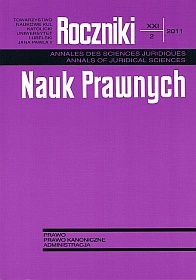Donations for Church Charities in the Income Tax on Physical Persons
Abstract
Legal consequences of physical persons making donations for Church charities can be analyzed both through the light of the Physical Person Tax Act of 26 July, 1991, and in terms of provisions included in laws on the State’s treatment of particular confessional associations. From the first perspective, they can be qualified as donations for charity work, mentioned in the act of 24 April, 2003, on the activity of public benefit entities and on voluntary work. This means that the donations may be deduced from the tax basis, with a deduction limit at 6 per cent of the payer’s net income. This kind of limit was not envisaged by confession laws (in particular the act of 17 May, 1989, on the relations between State and Catholic Church in Poland) regarding donations for Church charity work. Amendments to tax laws brought some doubts whether the provisions of confession laws did not lose force. The long dispute was ended with a resolution of the Supreme Administrative Court (14 March 2005), by virtue of which donations for Church charity work were all excluded from the donor’s tax basis. This provision has precedence over the regulations of the tax statute. Tax payers who wish to benefit from an unlimited deduction have to obey additional conditions. They are to pay their donations into the beneficiary’s bank account and should have a receipt from the beneficiary. Also, tax payers need a report on the way their donation was used within a period of two years afterwards. This procedure is essential for a deduction of donation without a limit.
Copyright (c) 2011 Roczniki Nauk Prawnych

This work is licensed under a Creative Commons Attribution-NonCommercial-NoDerivatives 4.0 International License.


